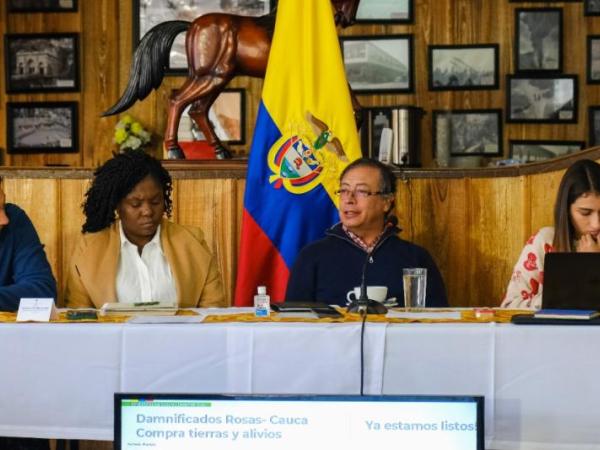After the landslides on the Pan-American highwaythe southwest of the country is cut off from the center, which has generated problems of shortages, mainly food and fuel in the region.
(Read: Ceasefire with the Eln will be discussed in February in Mexico).
Given the situation, President Gustavo Petro canceled his agenda in Europe and summoned a extraordinary council of ministers to take the corresponding measures and attend to the emergency that affects Nariño and Cauca.
In the short term, President Petro assured that alternative roads that are under construction will be opened in a maximum of 30 days. This will allow, according to him, cargo transportation and also normal transportation between the region and the rest of the country.
These were the measures announced:
Fixed gasoline prices and solutions to supply
One of the big problems in the area has been the supply of gasoline. For this reason, Petro assured that there are already established routes for this purpose. Some are maritime and the other crosses through Ecuador.
“The difficulty in bringing gasoline to the region determined a speculative price increase. We have decided to put an end to that at prices that, consulting the increase in freight and difficulties, seem normal to us.“, he assured.
The prices set by the government are: a maximum of 8,916 pesos per gallon of gasoline and 8,396 pesos per gallon of diesel. According to the head of state, today there is a balanced situation in this regard. But he warned that this is very fragile because at any moment another natural emergency could occur on another road.
(In addition: Petro called to “discuss in the streets” the reforms that are coming).
“We are going to increase fuel deliveries from the maritime corridor. There is a ship already fulfilling that function between Buenaventura and Tumaco. It arrives tomorrow at exactly 3 in the afternoon. This will continue until the emergency ceases.“, reported the President.
Government will buy crops in the department
Among other measures there is the purchase, by the Government, of crops from the department of Nariño. Which will be sent to the territories with the highest hunger rates in all of Colombia.
Along with this, land will be purchased in some places close to the disaster. “We want each family that owned half a hectare before the disaster to have five hectares of fertile land and be able to start a process of greater family and productive prosperity in the region,” he explained.
Work tables with milkmen and transporters
Petro also assured that work tables will be set up with members of the dairy and transport sector in the region, those most affected by the lack of road communication. Regarding the dairy industry, he said that they will look for more than 400,000 tons of milk to be purchased from the department’s producers in order to be transformed.
(Read: ‘Government has not really said how it will replace oil revenues’).
“The Government will buy this transformation to take it to the programs against hunger,” he assured.
For transporters, he said that the State will pay lFreight for the transport of less perishable goods produced in Nariño “in such a way that they are free for agricultural producers in the department.” “Our government assumes the freight if we reach an agreement with the transporter associations on its value and amount,” Petro said.
Liquefied gas price will be limited
Petro announced that a commission from the Ministry of Mines set the maximum price at which liquefied gas can be sold which, according to what he said, is widely used by Nariño families. This rate would be known in the coming days.
For one week, these measures will be evaluated. Depending on the results, a new meeting will be held in Ipiales to assess whether it is necessary to declare a national economic emergency.
BRIEFCASE
With information from EL TIEMPO*
















